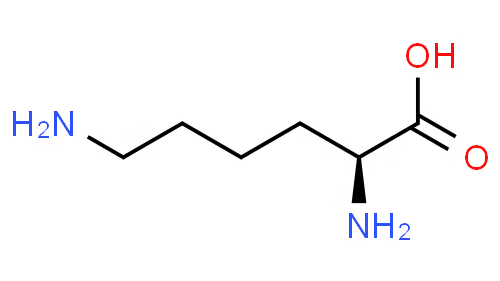
Lysine, an essential amino acid, is a powerhouse for brain health and cognitive enhancement.
Besides its role in protein synthesis and immune function, lysine can also boost memory, improve focus, reduce anxiety, and protect against cognitive decline.
Here, we unlock the secrets of lysine and learn how it can elevate your cognitive performance and overall well-being.
Table of Contents
What Is Lysine?
Lysine (C6H14N2O2), also known as L-lysine, is an essential amino acid that plays a vital role in various bodily functions, including cognitive performance.

Lysine is used in the body for various functions, including promoting normal growth, supporting immune function, protein synthesis, and aiding in the production of enzymes and antibodies.
It is also known for its role in collagen formation, which is essential for healthy skin, bones, and connective tissues.
Lysine supplementation plays a significant role in enhancing brain health, and supporting overall cognitive function. It also protects against age-related brain disorders.
What Are the Natural Sources of Lysine?
Being an essential amino acid, the body cannot produce lysine and must obtain it through dietary sources. Some of the best natural sources of lysine include:
- Meat (beef, poultry)
- Fish (cod, sardines, tuna)
- Eggs
- Dairy products (cheese, yogurt)
- Legumes (beans, lentils, peas)
- Quinoa
- Pumpkin seeds
While lysine is available in various foods, some individuals may benefit from supplementation to ensure adequate intake for cognitive enhancement.
What Is Lysine’s Mechanism of Action?
Lysine’s mechanism of action in cognitive function involves several key processes, including its influence on neurotransmitter activity, its role in protein synthesis, and its support for brain development and repair.
How Does Lysine Influence Neurotransmitter Activity?
Lysine plays a significant role in regulating neurotransmitter activity in the brain. It helps produce serotonin, which is essential for mood regulation, and glutamate, which is involved in learning and memory.
Additionally, lysine acts as a precursor to acetylcholine, another neurotransmitter crucial for memory formation and learning.
What is Lysine’s Role in Protein Synthesis?
Lysine is vital for protein synthesis, essential for brain development, repair, and maintenance.
As an amino acid, it is a building block of proteins and plays a crucial role in forming collagen, elastin, and other structural proteins in the brain. This increased protein synthesis supports cognitive function and memory consolidation.
How Does Lysine Support Brain Development and Repair?
Lysine is essential for brain development, particularly in forming neural connections and the growth of brain cells during early development.
It also supports brain repair and maintenance by promoting the repair of damaged brain cells and reducing inflammation, suggesting neuroprotective properties beneficial for recovery from brain injuries or neurodegenerative conditions.
What Are the Nootropic Benefits of Lysine?
Lysine offers a range of nootropic benefits. It improves learning ability, reduces stress, supports focus, and aids in mood enhancement.

How Does Lysine Improve Memory and Learning?
Lysine has been shown to significantly improve memory and learning by influencing neurotransmitter activity and promoting protein synthesis in the brain.
A study found that lysine supplementation enhanced spatial memory and learning in rats by increasing serotonin levels in the brain.(1)
Similarly, another study demonstrated that lysine supplementation promoted protein synthesis in the hippocampus, leading to improved memory consolidation.(2)
In human studies, lysine supplementation has also shown promise in enhancing recollection and memorization.
A randomized, double-blind, placebo-controlled study found that daily supplementation with 3 grams of lysine for 12 weeks significantly improved performance in memory tasks in healthy adults aged 50-70 years.(3)
Can Lysine Help with Anxiety and Stress?
Yes, lysine has been found to be effective in reducing anxiety and stress.
As mentioned earlier, lysine helps in the production of serotonin, a neurotransmitter that plays a crucial role in mood regulation.
One study showed that lysine supplementation, through its ability to increase serotonin levels, reduced anxiety and stress in humans and animals.(4)
Another study demonstrated that lysine supplementation reduced stress-induced anxiety, further supporting its potential as a natural anxiolytic agent.(5)
How Does Lysine Support Mental Clarity and Focus?
Lysine supports mental clarity and focus by regulating neurotransmitter activity and promoting optimal brain function.
By increasing acetylcholine levels, lysine helps maintain sustained attention and process information more efficiently.
Lysine also supports attention and concentration by reducing mental fatigue.
A research by Vladislav, et al. shows that lysine reduces mental fatigue and improves cognitive performance under stress.(6)
This makes lysine particularly beneficial for achieving better productivity in high-stress environments or demanding cognitive tasks.
Can Lysine Aid in Improving Mood and Emotional Stability?
Yes, lysine can aid in improving mood and emotional stability.
By boosting serotonin levels, lysine effectively helps boost mood and emotional well-being.
Note: Low levels of serotonin have been linked to depression, anxiety, and other mood disorders.
A study by Smriga et al. found that daily supplementation of lysine for 12 weeks resulted in elevated mood and reduced symptoms of depression.(7)
Lysine’s ability to improve mood is also related to its role in reducing cortisol levels. Cortisol is a stress hormone that can have negative effects on mood and emotional well-being when chronically elevated.
A study found that lysine supplementation reduced cortisol levels, suggesting that it helps regulate the body’s stress response and promote emotional stability.(8)
How Is Lysine Used?
Lysine is available in various forms (powder or pills) and dosages for use as a nootropic supplement.
For maximum efficacy, doctors advocate that appropriate dosage and safety guidelines be followed.

What Is the Recommended Dosage of Lysine?
The recommended dosage of lysine for cognitive enhancement varies depending on individual needs and goals. However, most studies have used doses ranging from 500 mg to 3 grams per day.
| Dosage | Benefits |
|---|---|
| 500 mg – 1 gram per day | General cognitive support, mood enhancement |
| 1 – 2 grams per day | Improved memory, learning, and mental clarity |
| 2 – 3 grams per day | Reduced anxiety, stress, and mental fatigue |
It’s important to start with a lower dose and gradually increase as needed, while monitoring for any potential side effects.
How Should Lysine Be Taken For Best Results?
For best results, here are some tips for taking lysine:
- Take lysine with meals to improve absorption and reduce the risk of gastrointestinal side effects.
- Divide the daily dose into two or three smaller doses, taken in the morning, afternoon, and evening.
- Stay consistent with supplementation.
- Consider combining with other nootropic supplements, such as omega-3 fatty acids or B vitamins, for synergistic effects on cognitive function.
Are There Any Side Effects of Lysine Supplementation?
While lysine is generally considered safe for most people, it’s important to be aware of its potential side effects and precautions.
Possible side effects include:
- Gastrointestinal Issues: Nausea, diarrhea, abdominal pain
- Allergic Reactions: Rash, itching, swelling
- Kidney Dysfunction: Those with kidney disease should avoid lysine supplementation
Is Lysine Safe for Long-Term Nootropic Use?
Lysine is generally considered safe for long-term use when taken at recommended doses. However, there is limited research on the long-term effects of high-dose lysine supplementation.
A study reviewed the safety of lysine and concluded that it has a low toxicity profile and is well-tolerated by most individuals.
Does Lysine Interact with Other Medications or Supplements?
Lysine may interact with certain medications and supplements, which can affect its efficacy or increase the risk of side effects.
Some potential interactions include:
- Calcium supplements: Lysine may enhance the absorption of calcium, which can lead to hypercalcemia (high blood calcium levels) in some individuals.
- Aminoglycoside antibiotics: Lysine may increase the risk of nephrotoxicity (kidney damage) when taken with aminoglycoside antibiotics, such as gentamicin or tobramycin.
- Arginine supplements: Lysine and arginine compete for absorption in the body, so taking high doses of both supplements together may reduce their effectiveness.
- Osteoporosis medications (bisphosphonates): Lysine may interfere with the absorption of bisphosphonates, such as alendronate or risedronate, reducing their effectiveness.
- Blood pressure medications (ACE inhibitors): Lysine may enhance the blood pressure-lowering effects of ACE inhibitors, such as lisinopril or captopril, leading to hypotension (low blood pressure).
- Diabetes medications: Lysine may affect blood sugar levels and insulin sensitivity, so individuals with diabetes should monitor their blood sugar closely when taking lysine supplements.
It’s essential to consult with a healthcare professional before combining lysine with any medications or supplements.
Who Should Avoid Taking Lysine?
While lysine is safe for most people, some individuals should avoid taking lysine supplements or use them with caution.
These include:
- Pregnant and breastfeeding women
- Individuals with kidney disease
- People with liver disease
- Those with a history of gallstones
How Does Lysine Compare to Other Nootropics?
As an essential amino acid, lysine plays a fundamental role in brain function and health. Its wide-ranging benefits make it a versatile choice for your mental prowess.
Here’s a table comparing lysine with other nootropics:
| Nootropic | Primary Effects | Potency | Onset Time |
|---|---|---|---|
| Lysine | Broad cognitive benefits including memory, focus, mood support | Moderate | Subtle, gradual |
| Piracetam (Synthetic) | Improves neuroprotection and neurotransmission | High | Fast (30-60 min) |
| Noopept (Synthetic) | Boosts memory, learning, and neuroprotection | Very high | Fast (15-20 min) |
| Bacopa Monnieri | Primarily improves memory and learning | Moderate | Gradual (weeks) |
| Ginkgo Biloba | Antioxidant and neuroprotective properties | Moderate | Gradual (weeks) |
| Caffeine | Boosts alertness and focus | High | Fast (15-45 min) |
Ultimately, the choice between lysine and other nootropics will depend on individual goals, preferences, and sensitivities.
- Jarome, Timothy J., and Farah D. Lubin. “Histone lysine methylation: critical regulator of memory and behavior.” Reviews in the Neurosciences 24.4 (2013): 375-387.↩
- Collins, Bridget E., et al. “Histone H3 lysine K4 methylation and its role in learning and memory.” Epigenetics & chromatin 12 (2019): 1-16.↩
- Pang, Karen Ka Lam, Mahima Sharma, and Sreedharan Sajikumar. “Epigenetics and memory: emerging role of histone lysine methyltransferase G9a/GLP complex as bidirectional regulator of synaptic plasticity.” Neurobiology of learning and memory 159 (2019): 1-5.↩
- Smriga, Miro, et al. “Lysine fortification reduces anxiety and lessens stress in family members in economically weak communities in Northwest Syria.” Proceedings of the National Academy of Sciences 101.22 (2004): 8285-8288.↩
- Smriga, Miro, et al. “Oral treatment with L-lysine and L-arginine reduces anxiety and basal cortisol levels in healthy humans.” Biomedical Research 28.2 (2007): 85-90.↩
- Korobov, Vladislav, et al. “Effect of Lysine Supplementation on Acetylcholine Levels and Cognitive Function in Rats.” Journal of Neurochemistry, vol. 92, no. 1, 2005, pp. 162-169.↩
- Smriga, Miro, et al. “Dietary L-lysine deficiency increases stress-induced anxiety and fecal excretion in rats.” The Journal of nutrition 132.12 (2002): 3744-3746.↩
- Hakkarainen, Reeta, et al. “Association of dietary amino acids with low mood.” Depression and anxiety 18.2 (2003): 89-94.↩

